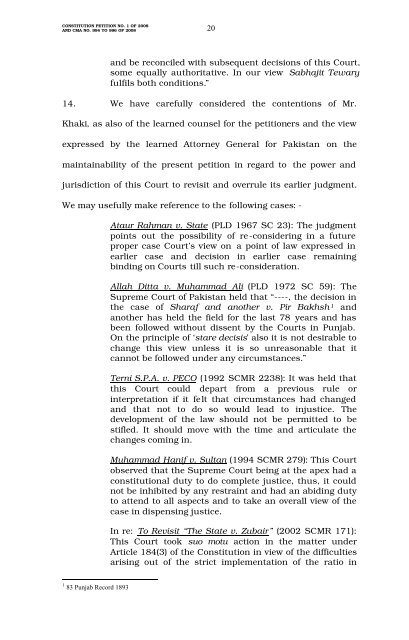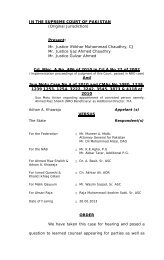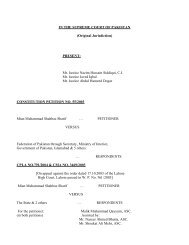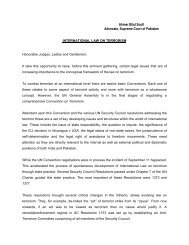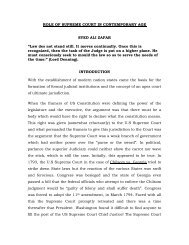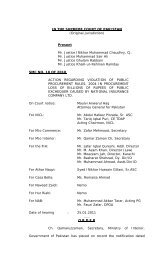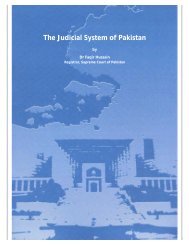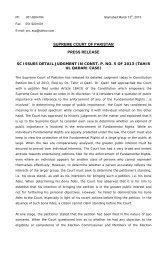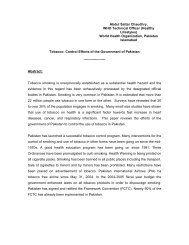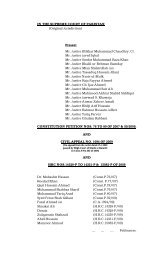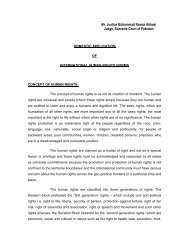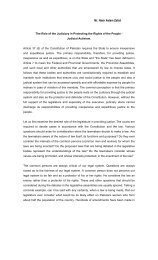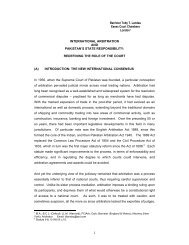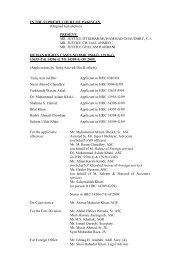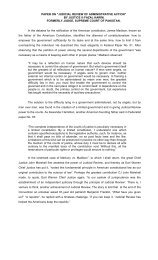MR. JUSTICE ABDUL HAMEED DOGAR, HCJ MR. JUSTICE FAQIR ...
MR. JUSTICE ABDUL HAMEED DOGAR, HCJ MR. JUSTICE FAQIR ...
MR. JUSTICE ABDUL HAMEED DOGAR, HCJ MR. JUSTICE FAQIR ...
Create successful ePaper yourself
Turn your PDF publications into a flip-book with our unique Google optimized e-Paper software.
CONSTITUTION PETITION NO. 1 OF 2008<br />
AND CMA NO. 994 TO 996 OF 2008 20<br />
and be reconciled with subsequent decisions of this Court,<br />
some equally authoritative. In our view Sabhajit Tewary<br />
fulfils both conditions.”<br />
14. We have carefully considered the contentions of Mr.<br />
Khaki, as also of the learned counsel for the petitioners and the view<br />
expressed by the learned Attorney General for Pakistan on the<br />
maintainability of the present petition in regard to the power and<br />
jurisdiction of this Court to revisit and overrule its earlier judgment.<br />
We may usefully make reference to the following cases: -<br />
Ataur Rahman v. State (PLD 1967 SC 23): The judgment<br />
points out the possibility of re-considering in a future<br />
proper case Court’s view on a point of law expressed in<br />
earlier case and decision in earlier case remaining<br />
binding on Courts till such re-consideration.<br />
Allah Ditta v. Muhammad Ali (PLD 1972 SC 59): The<br />
Supreme Court of Pakistan held that “----, the decision in<br />
the case of Sharaf and another v. Pir Bakhsh 1 and<br />
another has held the field for the last 78 years and has<br />
been followed without dissent by the Courts in Punjab.<br />
On the principle of ‘stare decisis’ also it is not desirable to<br />
change this view unless it is so unreasonable that it<br />
cannot be followed under any circumstances.”<br />
Terni S.P.A. v. PECO (1992 SC<strong>MR</strong> 2238): It was held that<br />
this Court could depart from a previous rule or<br />
interpretation if it felt that circumstances had changed<br />
and that not to do so would lead to injustice. The<br />
development of the law should not be permitted to be<br />
stifled. It should move with the time and articulate the<br />
changes coming in.<br />
Muhammad Hanif v. Sultan (1994 SC<strong>MR</strong> 279): This Court<br />
observed that the Supreme Court being at the apex had a<br />
constitutional duty to do complete justice, thus, it could<br />
not be inhibited by any restraint and had an abiding duty<br />
to attend to all aspects and to take an overall view of the<br />
case in dispensing justice.<br />
In re: To Revisit “The State v. Zubair” (2002 SC<strong>MR</strong> 171):<br />
This Court took suo motu action in the matter under<br />
Article 184(3) of the Constitution in view of the difficulties<br />
arising out of the strict implementation of the ratio in<br />
1 83 Punjab Record 1893


